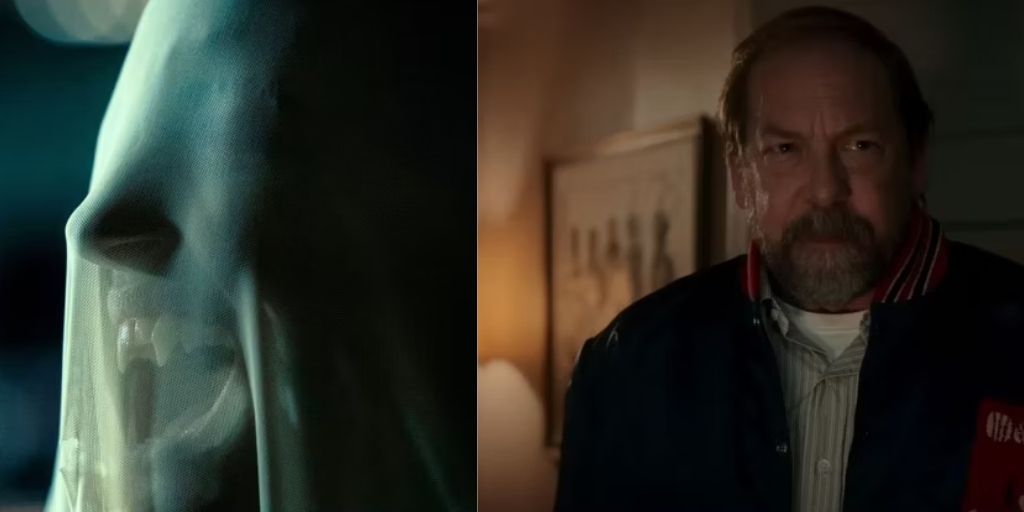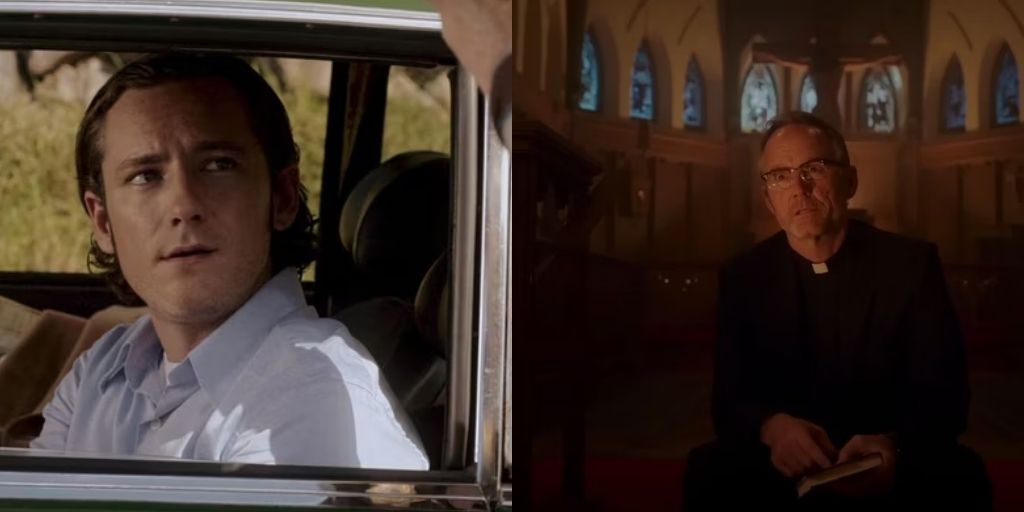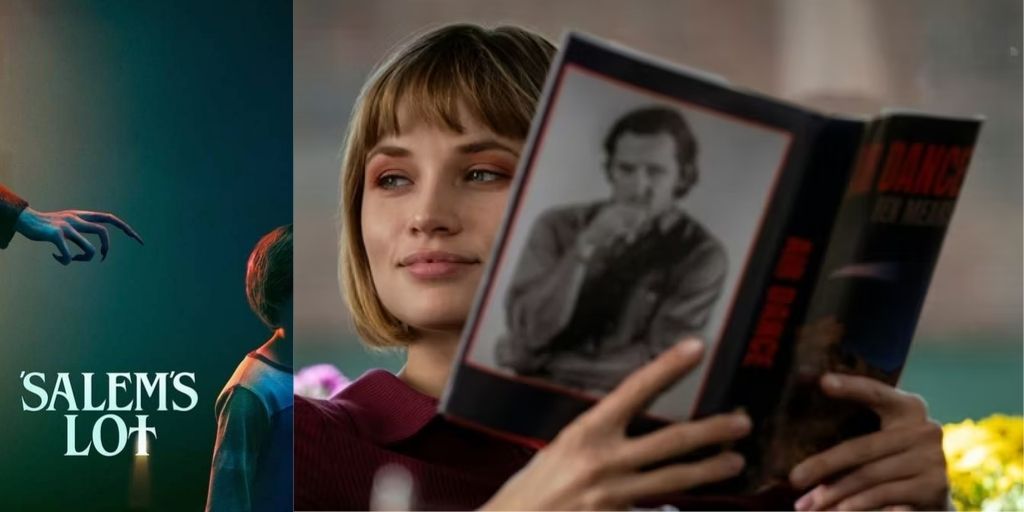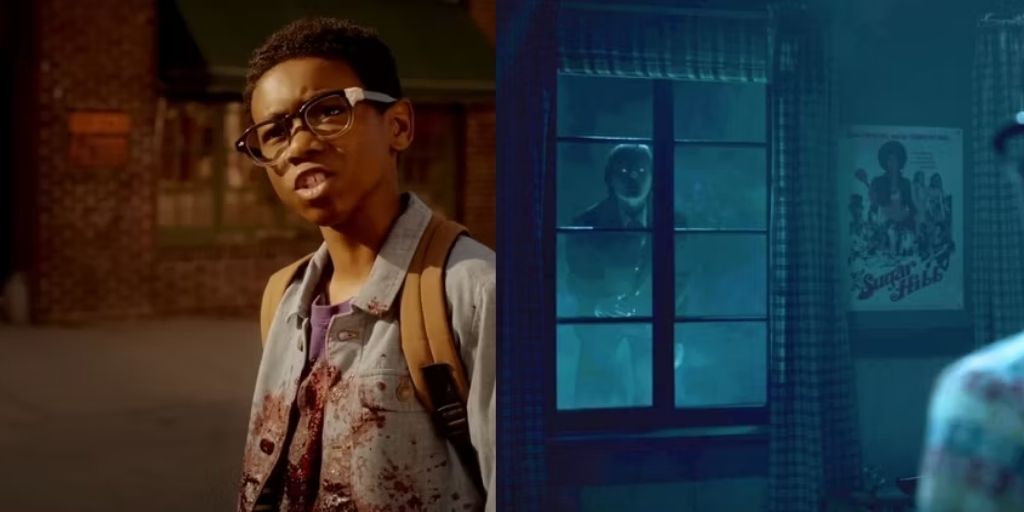One of Stephen King’s most cherished works, even by the author himself, is ‘Salem’s Lot. This classic vampire novel stands in the same tradition as Bram Stoker’s famous “Dracula.”
It tells the story of a group of unlikely individuals who come face to face with vampires, an extraordinary situation that forever changes their lives.
Over the years, there have been a few adaptations of this novel, but none has been as highly anticipated as Gary Dauberman’s 2024 feature film.
Initially delayed from its original 2020 release date, the movie has finally been made available on the Max streaming platform.
With the story now reaching more people than ever, let’s look closely at how this adaptation concludes and its significance for the small town of Jerusalem’s Lot.
It doesn’t take long for things to take a dark turn after the central character, Ben Mears (played by Lewis Pullman), returns to his childhood town, Jerusalem’s Lot.
The first major incident happens when young Ralph Glick (Cade Woodward) disappears.
Ralph is sacrificed to the vampire Kurt Barlow (portrayed by Alexander Ward) by Richard Straker (Pilou Asbæk), who serves as Barlow’s manservant.
This event plunges the entire town into chaos. As more people, including Mike Ryerson (Spencer Treat Clark), fall victim to the vampires working under Barlow’s influence, only a small group of individuals is aware of the horror that is spreading.
Ben, his new girlfriend Susan Norton (Makenzie Leigh), local schoolteacher Matt Burke (Bill Camp), Dr. Cody (Alfre Woodard), and a young boy named Mark Petrie (Jordan Preston Carter) become the town’s last line of defense against complete destruction.
Unfortunately, not everyone from this small group survives. When Matt and Mark attempt to infiltrate the Marsten House, where Barlow resides, they find themselves in great danger.
Barlow himself attacks them, turning Matt into a vampire. Straker also arrives at the scene and prepares Mark for sacrifice.
However, the young boy, who has quickly taken up the mantle of a vampire hunter, manages to escape. In the process, Mark kills Straker, Barlow’s human servant.

But the conflict doesn’t end there. Barlow soon finds a new ally in Susan’s mother, Anne Norton (Debra Christofferson).
She becomes his new human helper after Barlow promises that Susan, who dreams of leaving her small hometown behind, will be turned into a vampire and forced to remain in Jerusalem’s Lot forever.
Meanwhile, Ben, Dr. Cody, Susan, and Mark start planning their next move.
They decide to bring in the local priest, Father Callahan (John Benjamin Hickey), to help them.
Father Callahan agrees to assist by helping Mark explain the strange and deadly events to his parents.
However, things take a tragic turn when Barlow, seeking revenge for Straker’s death, attacks the Petrie house.
He kills Mark’s parents and seemingly kills Father Callahan as well. Though Mark manages to escape, he spends the night running and hiding from the bloodsuckers, narrowly avoiding becoming one of their victims.
At the same time, Ben and Susan try to confront Anne Norton and convince her to let Susan go.
However, instead of helping them, Anne sends a vampire to attack her own daughter, and Susan is turned into a vampire.
The next day, Ben, Mark, and Dr. Cody regroup and make a chilling discovery: the vampires have all gathered at the local drive-in theater.
These vampires, now an ever-growing group, sleep in the trunks of their cars during the daytime, waiting for nightfall to unleash terror.
Unfortunately, things only get worse when Ben finds a vampire Susan. Anne Norton, now fully under the control of Barlow, kills Dr. Cody. Ben and Mark barely manage to escape before the vampires start to wake up and move about.
Fortunately, Mark comes up with a clever plan to kill the vampires by burning most of them alive in the sunlight.
Anne is also killed in this fiery purge. However, as night approaches, the vampire lord Barlow wakes up.
He begins to chase Mark, while Susan attacks Ben. In a heart-wrenching moment, Ben is forced to kill Susan, the woman he loves.
In the final confrontation, Ben confronts Barlow. In a moment of bravery and desperation, Ben drives a wooden stake through the vampire’s head, killing him and saving Mark.
The two survivors then leave Jerusalem’s Lot behind as the sun rises, knowing that they have successfully destroyed the evil that consumed their town.
‘Salem’s Lot stays true to traditional vampire lore, and this adaptation is no different. Vampires cannot enter someone’s home unless they are invited.
A wooden stake through the heart, or even the head, can kill them. They also have a strong aversion to religious objects like crucifixes.
Throughout the movie, we see characters such as Ben, Mark, Susan, and Father Callahan use crosses, some of which are makeshift and blessed with prayers, to hold back the creatures of darkness.
Just like in the novel, these crosses glow white-hot when they come near evil and are capable of pushing back against vampires. However, these objects are not magical in themselves. To use them effectively, a person must have genuine faith.

One of the most powerful moments in the film happens when Father Callahan confronts Kurt Barlow.
The movie makes it clear early on that the priest has lost some of his faith over the years.
He struggles with alcoholism and has difficulty believing Ben, Susan, and Dr. Cody’s story at first, even though a medical expert supports it.
However, when Father Callahan finally faces the powerful Type One vampire, Barlow (a term that connects with King’s broader Dark Tower series), the priest manages to summon enough faith to hold the vampire at bay.
Unfortunately, his faith isn’t strong enough. Eventually, Father Callahan’s belief in the power of good falters. When this happens, the light of his cross fades, and Barlow easily kills him.
Though this moment is somewhat different from how it happens in the novel, the lesson is the same: faith is a person’s greatest weapon against the darkness. Without strong faith, even the bravest person becomes vulnerable to the influence of vampires.
Another significant theme throughout ‘Salem’s Lot is redemption, particularly through saving others.
In the movie, Ben is haunted by the death of his parents, who died in a car crash when he was a child. This tragic event isn’t in the book, but it plays a major role in the movie’s version of Ben’s character.
After his parents died, Ben spent some time living in Jerusalem’s Lot, and now, years later, he returns to face his personal demons.
However, instead of finding answers about life, Ben learns more about death. He is forced to kill Susan, and he sees the horrors of the town unfold as history begins to repeat itself through young Mark Petrie.
By helping to defeat the vampire threat and, most importantly, by saving Mark, Ben is able to find peace. Mark, like Ben, is new to the town. By saving Mark from the same fate that befell him as a child, Ben is able to let go of his own trauma.
The two characters share many similarities. Both of them lost their childhood innocence in sudden, tragic ways.
However, unlike Ben, who had no one to guide him through his loss, Mark has Ben by his side. As they leave town together, there’s a sense of hope for their futures.
One of the reasons ‘Salem’s Lot is considered a favorite among Stephen King’s many novels is because of its exploration of the decline of small towns. King has said in interviews that small towns are like dying organisms, slowly fading away.
The fictional town of Jerusalem’s Lot, based on a real town in Vermont called Jeremiah’s Lot, falls apart in front of us.
The concept of a vampire arriving from out of town and draining all the life from a small American town can be seen as a metaphor for the slow death many small towns experience in reality.
The film’s ending, while somewhat hopeful, still carries a sense of tragedy. Ben and Mark manage to kill all the vampires, but the town is left nearly empty, with far too many dead bodies to count.
It seems unlikely that anyone will return to Jerusalem’s Lot, as it is now just a shadow of its former self.

In ‘Salem’s Lot, Stephen King masterfully weaves together the themes of horror, faith, redemption, and the slow decline of small-town America.
The adaptation stays true to classic vampire lore, while also going through deeper, human struggles such as loss, wavering belief, and personal guilt.
Ben’s journey is not just a battle against vampires but also a fight to reconcile with his past and find redemption.
The character of Mark mirrors Ben’s childhood, offering him a chance to save someone from the trauma he endured. Through their battle with Kurt Barlow and his followers, both characters find closure, but the cost is heavy.
The fall of Jerusalem’s Lot can be seen as a larger commentary on the fading vitality of small towns, where outside forces drain life and leave only shells behind.
While Ben and Mark escape, victorious over the supernatural forces, the town remains a ghostly reminder of what once was, filled with sorrow and loss.
The ultimate message of ‘Salem’s Lot is a mix of hope and tragedy, reminding us that, although darkness can be defeated, the scars it leaves behind may never fully heal.
It is a testament to the enduring power of faith and the strength required to confront inner and outer demons.





